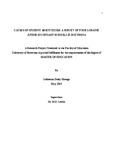| dc.contributor.author | Masogo, Goitseona Daisy | |
| dc.date.accessioned | 2016-07-15T05:56:57Z | |
| dc.date.available | 2016-07-15T05:56:57Z | |
| dc.date.issued | 2016-07-15 | |
| dc.identifier.uri | http://hdl.handle.net/10311/1460 | |
| dc.description | A dissertation submitted to the Dept. of Educational Foundation, Faculty of Education, University of Botswana in partial fulfilment of the requirement of the degree of Master of Education, Citation: Masogo, Goitseona D. (2015) Causes of student absenteeism: a survey of four Lobatse Junior Secondary Schools in Botswana, University of Botswana. | en_US |
| dc.description.abstract | The more absences a student accumulates, the less he or she can be expected to adequately partake in and comprehend classroom activities. It is apparent that high rates of student absenteeism are a problem that extends much further than the school. When asked for reasons behind it, the students normally give reasons that would be plausible and be taken as the truth by those in authority. Nevertheless the purpose of the research essay was to establish the causes of absenteeism in Junior Secondary School students in Lobatse. The sample included 120 Junior Secondary School students in the age range 12 to 18, from four secondary schools, Guidance and Counselling teachers, Heads of Departments, Deputy School Heads and School Heads.
A survey research design was used as the operational framework, where data was gathered through questionnaires given to students and to the teaching authorities in lower ranks and oral interviews conducted with the School Heads and their deputies. Data analysis involved the use of descriptive and inferential statistics. The findings revealed that the teachers had considerable knowledge of the characteristics of students who habitually absented themselves as well as the reasons behind the behaviour since they dealt directly with the respondents. The officers in high posts tackle the issue from a managerial level and normally delegate lower ranking teachers to deal with the problems of absenteeism. The age and gender of the students did not in any way reveal any correlation with absenteeism, nor did the use of drugs like alcohol and tobacco, but the students cited trouble at home as the major cause for their absenteeism. This research essay contributes to our understanding of the influence of different social factors towards student absenteeism and would better the authorities‟ address of unscheduled absences. The study recommends that school authorities should enforce policies on absenteeism and make thorough awareness of the repercussions of absenteeism, to both the students and their parents or guardians. | en_US |
| dc.language.iso | en | en_US |
| dc.subject | Junior Secondary Schools | en_US |
| dc.subject | causes | en_US |
| dc.subject | Lobatse | en_US |
| dc.subject | student absenteeism | en_US |
| dc.title | Causes of student absenteeism: a survey of four Lobatse Junior Secondary Schools in Botswana | en_US |
| dc.type | Masters Thesis/Dissertation | en_US |
| dc.link | Unpublished | en_US |

